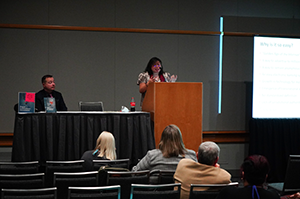
By Corinne MacIntire, AACRAO Associate Director of Membership and Publications.
In 2021, AACRAO published the Guide to Bogus Institutions and Documents, which offers an in-depth analysis of the many facets of fraudulent educational credentials. We were lucky enough to have two of the authors of this publication share their expertise with this year’s meeting attendees. Emily Tse, Director of Evaluations for the International Education Research Foundation (IERF) and Aleks Morawski, Director of Evaluation Services for Scholaro, joined us for an incredibly informative and engaging presentation on document forgery and diploma & accreditation mills. Morawski and Tse are both extremely experienced credential evaluators and pulled from their decades of experience to share practical advice and tips on how to confidently identify and confirm suspicious documents. Both presenters offered a rare and helpful glimpse into the world of educational credential fraud.
It is an unfortunate truth that fraudulent documents are a lucrative business. When there is money to be made, this type of forgery will happen. It is important for higher education administrators to understand the massive scope of this type of fraud and to understand the ways to identify and fight this fraud. In addition to providing context and history, the presenters provided recommendations for combating these issues going forward, as they are directly involved in efforts to combat these bogus institutions and diploma mills.
Digging into the issue
Morawski began the presentation with a discussion of the main types of transcript/diploma fraud (alteration and fabrication). He shared several astonishing examples of fraudulent credentials that were submitted to Scholaro for evaluation; some clear fabrications and others that required deep analysis to identify as bogus. He also dispelled the myth that educational forgery is an issue relegated to just a few countries. The use of fraudulent credentials is a global problem. Thankfully, Morawski shared several resources for the credential evaluator to use to confirm degrees and educational credentials. Next, Tse offered an in-depth analysis of how to identify fake schools. Beginning with an explanation of some key terms, she was able to show the ways in which fraudulent schools can skew the perception of unsuspecting students and further perpetuate the use of fraudulent documents. She also shared how technology, like the internet and basic photoshop, make the creation of fake documents, institutions, and accreditation mills a surprisingly common issue.
The pair of presenters shared an incredible wealth of examples of fraudulent documents, culled from their years of work in the profession. The attendees left the session with a solid grasp of the information and tools needed to face and fight the complex battle against documentary fraud. AACRAO is thankful to have the opportunity to work with such knowledgeable presenters and partners in academic integrity.
Want to learn more? Visit the AACRAO Bookstore to get your copy of the Guide to Bogus Institutions and Documents.